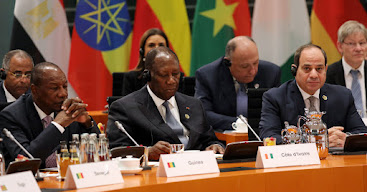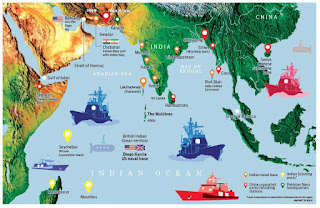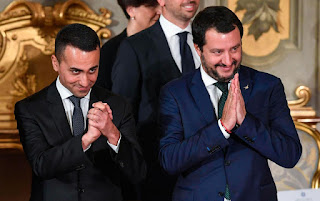Israel's Observer Status Inside African Union
By Naveed Qazi | Editor, Globe Upfront
Israel’s observer status inside African Union granted in July 2021 has split many political institutions in the continent. An observer status for Israel gives them the privilege to participate in the organisation’s activities, but they don’t have the ability to vote or propose resolutions, showing that an observer status gives limited rights. However, through it, Israel will fine-tune its diplomatic relations in the continent, and it will also help them fight extremism in the continent.
The consequences of recognising Israel could be as important as the 1975 Resolution 77 (XII) by the Organisation of African Unity, the predecessor of the African Union, which recognised Zionism as a form of racism.
Historically, many experiences between Africans and Palestinians converged, as they saw liberation struggles in lieu of Western imperialism. This can be explained in the wording of the above-mentioned Resolution 77 (XII), which equated between 'the racist regime in occupied Palestine and the racist regimes in Zimbabwe and South Africa' as they are all grounded in the same 'common imperialist origin … (and are) organically linked in their policy aimed at the repression of the dignity and integrity of the human being.'
Realising this, Israel has worked diligently to strengthen its presence in Africa. Currently, Israel is recognised by forty-six of the fifty-five members of the African Union. Additionally, it operates seventeen embassies and twelve consulates throughout the continent. Some of Israel’s latest diplomatic victories include ties with Chad in 2019 and Morocco and Sudan in 2020, all being Muslim-majority countries.
The diplomatic shift in Africa happened when they saw Palestine and other Arab countries ‘doing business’ with Israel. Many African countries felt that their solidarity was no longer serving a particular purpose. Africa’s Israeli boycott, which initially began in 1973, faltered soon after the Palestinian leadership itself signed a series of agreements with Israel, starting with the Oslo Accords of 1993. Thus, there was an eventual revival of diplomatic ties with Tel Aviv.
Israel has been trying to win back observer status for twenty years, ever since it lost it when the Organisation of African Unity was disbanded in 2002, to make way for its replacement organisation, the African Union. Libyan leader Moammar Gaddafi was behind Israel’s original ouster.
There is also little evidence to suggest that Palestinian Authority tried to win back many African countries by launching a coordinated counter-campaign. Nonetheless, the occupied Palestinian territory already has observer status at the African Union, and pro-Palestinian language is typically featured in statements delivered at the AU’s annual summits.
According to Palestinian writer Ramzy Baroud, there is a renewed scramble for Africa, not only by Israel but also by Russia, China, the United States, which has forced Africa to pursue pragmatic thinking, thereby abandoning the old discourse regarding colonial liberation and decolonisation. As Israel is projecting itself as a rising superpower, it has led Africa to buy unmanned drones, digital monitoring, and surveillance technology from them.
However, it was on February 2022, when PA Prime Minister Mohammed Shtayyeh retaliated at an African Union Summit, and called for withdrawal and objection to Israel’s observer status. It was in July 2021, which had led Moussa Faki Mahamat, as Chairman of the African Union Commission, who decided to take it upon himself to grant Israel observer status. Those African states which did not toe his line were tainted as ‘nations having double standards’ by him. Despite this stance, the 2022 AU Summit also proved that there are some takers of Palestine in the continent, even though there are many shortcomings in the Palestinian leadership.
In truth, Faki had his own reasons to grant Israel the coveted status. The AU Commission Chairperson was Chad’s Foreign Minister until 2017. Though Chad did not declare its diplomatic ties with Israel until 2019, he must have played a significant role in paving the way for the N’Djamena-Tel Aviv official connection.
Algeria and South Africa came to the rescue of Palestinians, but they failed to kick out Israel, as AU Commission argued that it acted within its ‘full sphere of competence’ reading of the AU document, setting out the criteria for granting observer status and the system of accreditation. This also gives a reason for the watchers to note that Israel is getting accepted in the global community, more easily than before. AU has realised, in its own way that isolating Israel, will not promote the well-being of Palestinians, but this viewpoint will become a bone of contention for rejectionists anyhow.
The only thing that would work for Palestinians, in terms of working for rejection of Israel’s African Union observer status, is to formulate counter strategies. Those strategies, include mobilising civil society organisations, by sending strong, collective messages that Israel is not welcomed in Africa. It is because a region mired by colonialism, neo-colonialism, and apartheid will pay a heavy moral price for itself if it does business with another colonial apartheid regime.




Comments
Post a Comment
Advice from the Editor: Please refrain from slander, defamation or any kind of libel in the comments section.